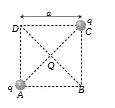A square of side a charge Q at its centre and charge q at one of the corners. The work required to be done in moving the charge q from the corner to the diagonally opposite corner is
Zero
Qq4πε0a
Qq√24πε0a
Qq2πε0a
The correct Answer is:A
W=q(VC−VA)
Since VC=VA
W = 0

Topper's Solved these Questions
- BOOK - ERRORLESSCHAPTER - ELECTROSTATICSEXERCISE - NCERT BASED QUESTIONS (Electric Dipole)21videos
ELECTROSTATICS
- BOOK - ERRORLESSCHAPTER - ELECTROSTATICSEXERCISE - NCERT BASED QUESTIONS (Electric Flux and Gauss.s Law)27videos
ELECTROSTATICS
- BOOK - ERRORLESSCHAPTER - ELECTROSTATICSEXERCISE - ASSERTION & REASON25videos
ELECTROSTATICS
- BOOK - ERRORLESSCHAPTER - ELECTRONICSEXERCISE - Assertion & Reason26videos
ELECTRONICS
- BOOK - ERRORLESSCHAPTER - MAGNETIC EFFECTS OF CURRENT EXERCISE - ASSERTION & REASON18videos
MAGNETIC EFFECTS OF CURRENT
Similar Questions
A charge of 60n C (nanocouloumb) is palced at the corner A of a square ABCD is side 10cm. Another charge of -10nc is located at the centre of the square. Find the work done in carrying a charge of +5 nC from the corner C to the corner B of square.
View SolutionA point charge q is kept at a corner of a cube
View Solution
Knowledge Check
- Question 1 - Select One
A square of side a has charge Q at its centre and charge q at one of the corners. The work required to be done in moving the charge q from the corner to the digitally opposite corner is :
AZeroBQq4πε0aCQq√24πε0aDQq2πε0a - Question 2 - Select One
A square of side a has charge Q at its centre and charge q at one of the corners. The work required to be done in moving the charge q from the corner to the digitally opposite corner is :
AZeroBQq4πε0aCQq√24πε0aDQq2πε0a - Question 3 - Select One
A charge of 10μC lies at the centre of a square. Work done in carrying a charge of 2μC from one corner of square to the diagonally opposite corner is
A20JB5JCZeroD20μJ
Four equal charges Q are placed at the four corners of a square of each side is 'a'. Work done in removing a charge −Q from its centre to infinity is
View SolutionFour equal charges Q are placed at the four corners of a square of each side is 'a'. Work done in removing a charge −Q from its centre to infinity is
View SolutionThree equal charges Q are placed at the three corners of an equilateral triangle of side length a. Work done in shifting a charge q from infinity to the centroid of the triangle is
View SolutionTwo positive charges of magnitude q are placed at the ends of a side ( side 1) of a square of side 2a . Two negative charges of the same magnitude are kept at the other corners . Staring from rest , n a charge Q moves from the middle of side 1 to the centre of square , its kinetic energy at the centre of square is -.
View SolutionThree point charges, which initially are infinitely far apart, are placed at the corners of an equilateral triangle with sides d. Two of the point charges are identical and have charge q.If zero net work is required to place the three charges at the corners of the triangles, what must the value of the third charge be?
View Solution
